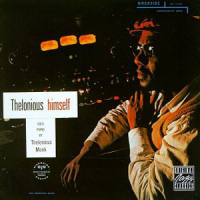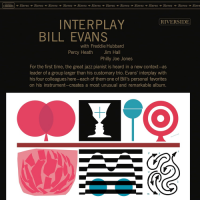Home » Jazz Articles » Multiple Reviews » OJC Piano Greatness: Thelonious Monk & Bill Evans
OJC Piano Greatness: Thelonious Monk & Bill Evans
 Thelonious Monk
Thelonious Monk Thelonious Himself
Craft Recordings
1957/2025
Although Thelonious Monk first made his mark with groundbreaking recordings for Blue Note in the late 1940s, it was under the guidance of producer Orrin Keepnews at Riverside Records that he truly came into his own. Always searching for ways to broaden Monk's appeal, Keepnews encouraged him to begin his Riverside tenure with albums featuring more accessible repertoire. Monk agreed, offering a full album of Duke Ellington compositions followed by another devoted to jazz standards.
By the time of his fourth Riverside release, Monk chose a more personal route: a mix of well-known tunes and original compositions, all rendered in unaccompanied solo form. Recorded in the spring of 1957, Thelonious Himself is a highly regarded album that offers a rare, intimate glimpse into the pianist's singular musical mind. The opener, "April in Paris," sets the tone, with Monk adhering closely to the melody while weaving in subtle flourishes. On "I'm Getting Sentimental Over You," he plays with deliberate pacing, as though weighing each note like a chess move. Midway through, he shifts into a brief stride section before gently returning to the theme. "I Should Care" exemplifies Monk's gift for phrasing, as he uses the spaces between lines to insert glinting arpeggios that bear his unmistakable stamp.
Among the originals, "Functional" stands out as the longest track, nearly ten minutes of exploratory blues. Monk alternates between block chords and single-note runs, occasionally injecting bursts of boogie-woogie that lend the piece added character. Though his reading of "'Round Midnight" isn't the definitive version, it remains a brooding, dramatic tone poem that deepens with each listen. The album closes with "Monk's Mood," which begins as a solo meditation before John Coltrane and Wilbur Ware join three minutes in, transforming the track into a poignant ensemble moment and a fitting end to this introspective session.
 Bill Evans
Bill Evans Interplay
Craft Recordings
1963/2025
Following his collaboration with Cannonball Adderley on Know What I Mean? (Riverside, 1962), recorded in early 1961, Evans expanded his ensemble further for Interplay, laid down in the summer of 1962. The lineup—Freddie Hubbard, Jim Hall, Percy Heath, and Philly Joe Jones—proved to be one of the most inspired in Evans' discography. Evans and Jones already had an established rapport dating back to 1959, a relationship that would continue into the late '60s with highlights like the stellar 1967 Village Vanguard recordings. Jones consistently challenges Evans rhythmically, coaxing him into more extroverted territory. Meanwhile, Hall provides subtle harmonic support—no easy feat with a pianist as harmonically rich as Evans—without ever crowding the texture.
Hubbard, fresh from a string of Blue Note sessions and his Impulse! debut, balances fiery energy with lyrical restraint. On the opener, "You and the Night and the Music," he adds taut intensity, framed by a catchy tag that reappears between the head and solos. His muted trumpet on "I'll Never Smile Again" offers a delicate sparkle, enhanced by Jones' responsive fills before the return of the theme.
The title track, which opens side two, is a highlight. Bass and guitar voice the melody in tandem before Evans and a muted Hubbard enter, layering color and contrast. Hall's solo here is particularly fluid and lyrical, among his finest moments on the session. The set concludes with the swing-era chestnut "Wrap Your Troubles in Dreams," where Evans delivers some of his most inventive soloing of the date. Unmuted, Hubbard follows with a powerful and imaginative chorus marked by both substance and a rich, burnished tone.
Like the Monk release, this reissue is packaged in a glossy tip-on jacket with an obi strip featuring original personnel and a vintage Down Beat review. Both albums benefit from Kevin Gray's top-tier mastering and RTI's strong pressings. Review copies were flat, quiet, and free of defects, offering sound quality that rivals or surpasses reissues at much higher price points.
Tracks and Personnel
Thelonious Himself Tracks: April in Paris; Ghost of a Chance; Functional; I'm Getting Sentimental Over You; I Should Care; 'Round Midnight; All Alone; Monk's Mood.Personnel: Thelonious Monk: piano; John Coltrane: tenor sax; Wilbur Ware: bass.
Interplay
Tracks: You and the Night and The Music; When You Wish Upon a Star; I'll Never Smile Again; Interplay; You Go to My Head; Wrap Your Trouble in Dreams.
Personnel: Bill Evans: piano; Freddie Hubbard: trumpet; Jim Hall: guitar; Percy Heath: bass; Philly Joe Jones: drums.
Tags
Multiple Reviews
Thelonious Monk
C. Andrew Hovan
United States
New York
New York City
duke ellington
Craft Recordings
John Coltrane
WIlbur Ware
Cannonball Adderley
Freddie Hubbard
Jim Hall
Percy Heath
Philly Joe Jones
PREVIOUS / NEXT
Support All About Jazz
 All About Jazz has been a pillar of jazz since 1995, championing it as an art form and, more importantly, supporting the musicians who make it. Our enduring commitment has made "AAJ" one of the most culturally important websites of its kind, read by hundreds of thousands of fans, musicians and industry figures every month.
All About Jazz has been a pillar of jazz since 1995, championing it as an art form and, more importantly, supporting the musicians who make it. Our enduring commitment has made "AAJ" one of the most culturally important websites of its kind, read by hundreds of thousands of fans, musicians and industry figures every month.





















